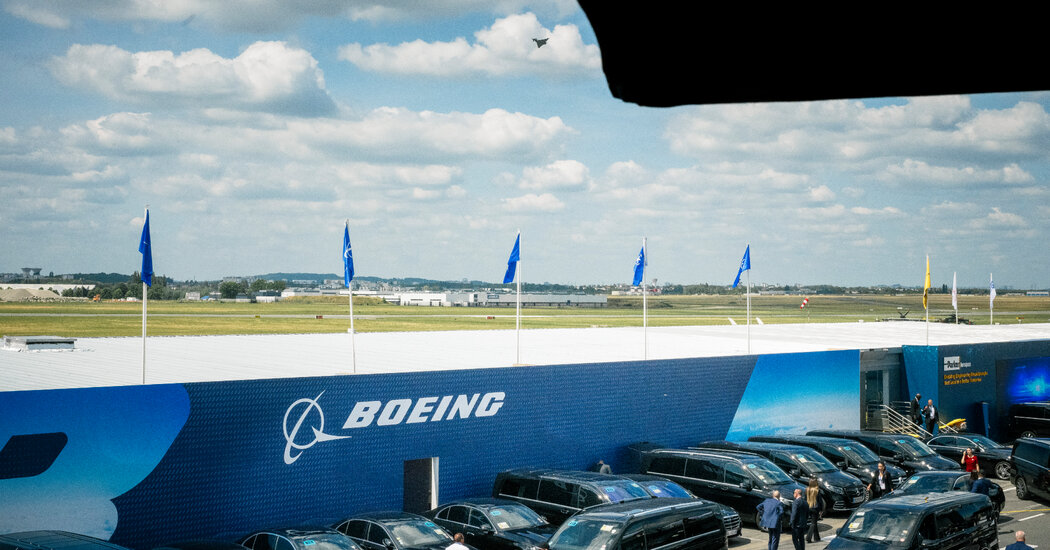Every other year, thousands of visitors flock to a Paris suburb for the Paris Air Show, one of the aerospace industry’s biggest events. The atmosphere is typically celebratory, but the recent deadly crash of an Air India flight cast a shadow over the show this week.
The contrasting moods were apparent in the rivalry between two of the show’s most prominent aircraft manufacturers: Airbus and Boeing. Airbus said it had withheld some announcements, but still promoted a wave of orders for new commercial jets. Boeing kept an unusually low profile, reporting no deals. The company said it had canceled some plans out of respect for those killed in the crash of Air India Flight 171 last week, which involved one of its 787 Dreamliner jets.
The cause of the crash, in which at least 270 people died in the plane and on the ground, has yet to be determined. But it comes at a delicate moment for Boeing, which had appeared to be moving past a series of setbacks in recent years. The company reported nearly 350 orders last month, some of which were part of a trade deal between the United States and Britain. That made May Boeing’s best month for sales in a year and a half. Boeing also reached a crucial production target last month for its most popular plane, the 737 Max.
At the show, held at Le Bourget Airport, companies show off their products and executives negotiate deals in back rooms. The long, hot days are punctuated by the roar of commercial and military jets flying overhead, attracting crowds of onlookers.
Boeing’s chief executive, Kelly Ortberg, and the head of its commercial plane unit, Stephanie Pope, were scheduled to attend, but canceled their plans to “be with our team, and focus on our customer and the investigation,” Mr. Ortberg wrote in a message to employees after the crash.
The company was still in attendance, but it made no major announcements, even though it might have been preparing some deals privately in the weeks before the show. In a building where Boeing hosted meetings with customers and suppliers, bouquets of red and white roses were placed in the entry halls alongside a silver-framed homage that read: “Honoring those affected by Air India Flight 171.”
“This show definitely has a very different tone for us in the Boeing Company,” Turbo Sjogren, a Boeing executive said in a briefing about the company’s defense business in Europe. The victims of the crash are on the minds of everyone at Boeing, he said, adding, “It affects all of our employees.”
The sober atmosphere for Boeing was a contrast to Airbus, which boasted major orders for its most popular jets, including 40 A220 single-aisle jets for LOT Polish Airlines and a deal with VietJet for up to 150 single-aisle jets. Airbus also scored big wins in Saudi Arabia, which wants to become an international air travel hub: Riyadh Air ordered 25 A350 wide-body aircraft, while AviLease, a Saudi jet leasing company, ordered 40 commercial and cargo jets.
Still, Airbus said it chose to hold back some announcements.
“The cold shower we all had was the Air India accident, so we’ve actually scaled back,” said Christian Scherer, the chief executive of Airbus’s commercial aircraft business.
He added that although aerospace is extremely competitive, Airbus never uses safety to its advantage: “You don’t go there.”
Boeing has been in catch-up mode the last few years as its rival has pulled ahead in orders. Even if it does see any slowdown in business because of the crash, it will probably be temporary if the investigation clears the plane itself, said Richard Aboulafia, a managing director at AeroDynamic Advisory, a consulting firm.
“If there’s any pullback from orders in the aftermath of this tragedy, it’s purely for optics,” he said. Airlines remain confident in Boeing’s planes and have only one major alternative in Airbus.
It could take months to determine the cause of the crash. The plane’s flight data recorder and cockpit voice recorder, both of which have been recovered, should yield a wealth of information, experts said.
It was the first fatal crash involving a Dreamliner, a popular choice for long-distance routes because of its range, fuel efficiency and other factors. More than 1,100 are in service today, according to Cirium, an aviation data firm.
India’s aviation authority, the Directorate General of Civil Aviation, said on Tuesday that a review of Air India’s remaining Dreamliner planes “did not reveal any major safety concerns.”
Globally, there have been fewer crashes so far this year from the same period last year, according to Cirium. The number of people killed in the crashes this year, however, is the highest since a similar period in 2018.
Safety aside, conversations at the air show focused on the slowly improving bottlenecks in the supply chain, a rise in military spending in Europe and the weight of global tariffs. Speaking at the show, the U.S. transportation secretary, Sean Duffy, called for a return to free trade in aerospace, a leader among U.S. industries in exporting more than it imports.
Niraj Chokshi is a Times reporter who writes about aviation, rail and other transportation industries.
Liz Alderman is the chief European business correspondent, writing about economic, social and policy developments around Europe.
The post Boeing Keeps Low Profile at Paris Air Show as Airbus Announces Deals appeared first on New York Times.




